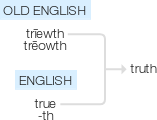Truth
Old English trīewth, trēowth ‘faithfulness, constancy’ (see true, -th2).
wiktionary
From Middle English trouthe, truthe, trewthe, treowthe, from Old English trēowþ, trīewþ(“truth, veracity, faith, fidelity, loyalty, honour, pledge, covenant”), from Proto-Germanic *triwwiþō(“promise, covenant, contract”), from Proto-Indo-European *drū-(“tree”), from Proto-Indo-European *deru-(“firm, solid”), equivalent to true + -th. Cognate with Norwegian trygd(“trustworthiness, security, insurance”), Icelandic tryggð(“loyalty, fidelity”).
etymonline
truth (n.)
Old English triewð (West Saxon), treowð (Mercian) "faith, faithfulness, fidelity, loyalty; veracity, quality of being true; pledge, covenant," from Germanic abstract noun *treuwitho, from Proto-Germanic treuwaz "having or characterized by good faith," from PIE *drew-o-, a suffixed form of the root *deru- "be firm, solid, steadfast." With Germanic abstract noun suffix *-itho (see -th (2)).
Sense of "something that is true" is first recorded mid-14c. Meaning "accuracy, correctness" is from 1560s. English and most other IE languages do not have a primary verb for "speak the truth," as a contrast to lie (v.). Truth squad in U.S. political sense first attested in the 1952 U.S. presidential election campaign.
At midweek the Republican campaign was bolstered by an innovation—the "truth squad" ..., a team of senators who trailed whistle-stopping Harry Truman to field what they denounced as his wild pitches. [Life magazine, Oct. 13, 1952]
Let [Truth] and Falsehood grapple; who ever knew Truth put to the worse, in a free and open encounter. [Milton, "Areopagitica," 1644]
